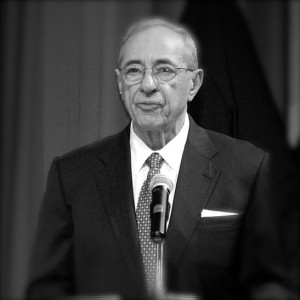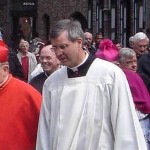From CNN:
Former New York Gov. Mario Cuomo has died, according to his son Chris Cuomo, host of CNN’s “New Day.”
Mario Cuomo had been hospitalized recently to treat a heart condition. He was 82.
Cuomo was New York’s governor for three terms from 1983 to 1995.
He was married to his wife, Matilda, for more than six decades. They had five children, including current New York Gov. Andrew Cuomo.
Asked once how we wanted to be remembered, Mario Cuomo replied: “One of the simple things I wanted to achieve is — I want to be governor. I want to be the hardest working there ever was. And I want, when it’s over — and I figured on four years at first — I want people to say, now, there was an honest person.”
In 1984, Cuomo delivered a speech at the University of Notre Dame in which he discussed his faith and the ongoing political debate about abortion, arguing for a separation between religious beliefs and public policy:
Recently, Michael Novak put it succinctly: “Religious judgment and political judgment are both needed,” he wrote. “But they are not identical.”
My church and my conscience require me to believe certain things about divorce, birth control and abortion. My church does not order me — under pain of sin or expulsion — to pursue my salvific mission according to a precisely defined political plan.
As a Catholic I accept the church’s teaching authority. While in the past some Catholic theologians may appear to have disagreed on the morality of some abortions (it wasn’t, I think, until 1869 that excommunication was attached to all abortions without distinction), and while some theologians still do, I accept the bishops’ position that abortion is to be avoided.
As Catholics, my wife and I were enjoined never to use abortion to destroy the life we created, and we never have. We thought Church doctrine was clear on this, and — more than that — both of us felt it in full agreement with what our hearts and our consciences told us. For me life or fetal life in the womb should be protected, even if five of nine Justices of the Supreme Court and my neighbor disagree with me. A fetus is different from an appendix or a set of tonsils. At the very least, even if the argument is made by some scientists or some theologians that in the early stages of fetal development we can’t discern human life, the full potential of human life is indisputably there. That — to my less subtle mind — by itself should demand respect, caution, indeed . . . reverence.
But not everyone in our society agrees with me and Matilda.
And those who don’t — those who endorse legalized abortions — aren’t a ruthless, callous alliance of anti-Christians determined to overthrow our moral standards. In many cases, the proponents of legal abortion are the very people who have worked with Catholics to realize the goals of social justice set out in papal encyclicals: the American Lutheran Church, the Central Conference of American Rabbis, the Presbyterian Church in the United States, B’nai B’rith Women, the Women of the Episcopal Church. These are just a few of the religious organizations that don’t share the Church’s position on abortion.
Certainly, we should not be forced to mold Catholic morality to conform to disagreement by non-Catholics however sincere or severe their disagreement. Our bishops should be teachers not pollsters. They should not change what we Catholics believe in order to ease our consciences or please our friends or protect the Church from criticism.
…The values derived from religious belief will not — and should not — be accepted as part of the public morality unless they are shared by the pluralistic community at large, by consensus….what is ideally desirable isn’t always feasible, that there can be different political approaches to abortion besides unyielding adherence to an absolute prohibition.
Not long after that, New York’s Cardinal John O’Connor reportedly considered excommunicating Cuomo for his stance.
That was the beginning of a long and sometimes bitter public conflict between the cardinal and Cuomo over the subject of abortion:
A month later Archbishop O’Connor gave a speech before a Catholic Medical Group—with Mother Teresa sitting on the stage—in which he challenged the Cuomo thesis: “You have to uphold the law, the Constitution says. It does not say that you must agree with the law, or that you cannot work to change the law.”
There are those who argue that we cannot legislate morality. The reality is that we do legislate behavior every day. . . . It is obvious that law is not the entire answer to abortion. Nor is it the entire answer to theft, arson, child abuse, or shooting police officers. Everybody knows that. But who would suggest that we repeal the laws against such crimes because the law is so often broken.
He ended by reasserting his original public stance:
I have the responsibility of spelling out. . .with accuracy and clarity what the Church officially teaches. . . . I have simultaneously the obligation to try to dispel confusion about such teaching wherever it exists, however it has been generated, regardless of who may have generated it. . . . I recognize the dilemma confronted by some Catholics in political life. I cannot resolve that dilemma for them. As I see it, their disagreement, if they do disagree, is not simply with me [but] with the teaching of the Catholic Church.
You can read more about it here.
Above and beyond all that, Mario Cuomo was also a spellbinding orator—eloquent, impassioned, poetic, persuasive.
This speech from the Democratic Convention in 1984 will go down as one of the greats from the last century:
Tonight, whisper a prayer for Mario Cuomo, for his family, and all those who love him.
May he know God’s mercy. And may he rest in peace.













